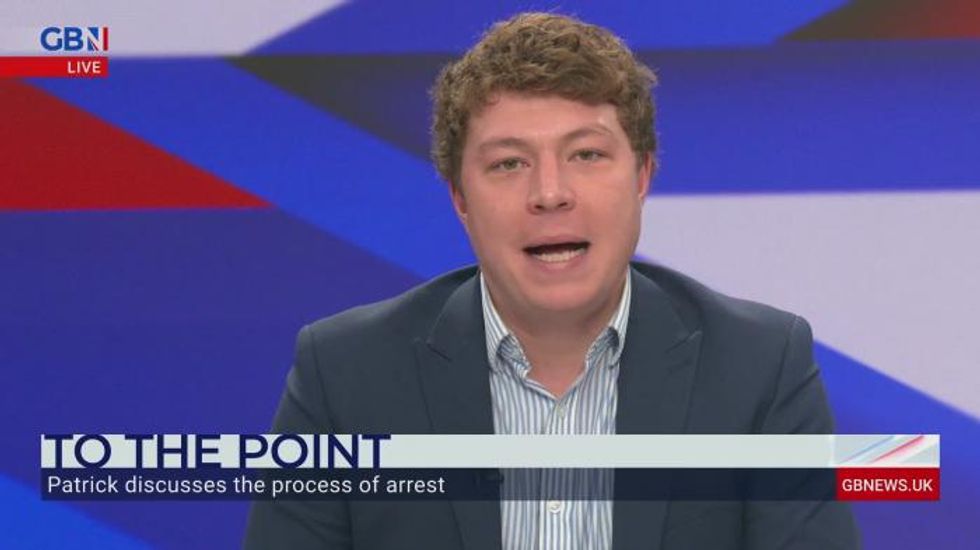Don't Miss
Most Read
Trending on GB News
A new Met Police policy on handcuffing tells officers to ask themselves 44 questions before arresting a suspect and details the procedure in a child-style ABC guide.
The mammoth decision process is laid out in full in the new 25-page document published by Scotland Yard.
The questions include, 'What could go wrong (and what could go well)?', 'What is happening?', and, 'What do I not know?'.
Other advice to mull over also includes, 'Do I need to take action immediately?' and 'What would the victim or community affected expect of me in this situation?'
I think there’s really just one question that needs to be asked here – Why is Met Commissioner Cressida Dick still in a job?
By the time officers have run through all those questions, the criminal will be in a different postcode. They’ll already be burgling the next house.
This list of ridiculous questions will put doubt in the mind of police officers right at the moment when they need clarity and certainty – i.e. mid arrest, mid confrontation. I can see it now, can’t you, the bobbies on the beat hauled before a tribunal after arresting someone – So, Officer, are you admitting that during the course of detaining that machete wielding drug kingpin you DIDN’T ask yourself question number 25 which clearly states that you have to consider if there is any research evidence on this matter.
That’s actually question number 25 by the way, is there any research evidence, it comes after question 24 What legislation might apply? And before question 26 - If decision makers have to account for their decisions, will they be able to say they were proportionate, legitimate, necessary and ethical?
Hardened criminals will be laughing at this.
Also featured is an alphabet-themed guide to handcuffing that warns to, 'Always ask the suspect if the cuffs are too tight'.
There is even a primary school-style guide for police officers when it comes to handcuffing suspects. It’s an ABC…check this out – A – apply the handcuffs, B be sure to ask the subject if they’re too tight, C – check the handcuffs for tightness, D – Double lock the handcuffs, E - Evidence – tell the suspect why they’re handcuffed.
And then they presumably sit around in a circle and sing nursery rhymes before deciding which one takes the school hamster home with them this weekend.
A lot of this has come about as a result of anger amongst certain ethnic communities over the rate of stop and search.
There were 558,973 stop and searches carried out in the year to March , 2020, under Section 1 of the Police and Criminal Evidence Act 1984 (Pace) in England and Wales, according to Home Office figures.
Just 13 per cent (73,423) of that year's stop and searches led to an arrest - down from last year's 15 per cent.
The increase in stop and searches was larger for white people in 2021 (with an increase of 95,562 to 280,661) than for black, Asian and minority ethnic backgrounds people (who saw an increase of 55,215 searches to 185,401).
But BAME people were stopped at a rate of 4.1 times higher than those who were white, a similar rate to the previous year (4.3), the report added.
And the rate of black people who were stopped and search per 1,000 of the population was at its highest since 2014 at 54, compared with 35 in 2014.
This is the highest number of stops and searches since 2013/14 (872,518), but still below the peak in 2010/11 (1,179,746), the report said.
Now there could be a few explanations for this – one is that the police force is institutionally racist. Well I don’t buy that – there will be racist police officers, but I genuinely don’t think there’s a racist core at the heart of our police force.
There are, unfortunately, various socio-economic factors that can lead to people, especially from a new immigrant background, living in some areas with higher crime rates, greater deprivation, etc, as they make the first stepson their route to a better life and future.
This can lead to more stop and searches.
It’s a very difficult job being a police officer, they won’t always get it right, there will be bad police officers, there’ll be thick police officers, but there’ll also be brilliant ones and we shouldn’t infantilise them.
I’ll say it again – perhaps instead of Cressida Dick getting her police officers to ask 44 questions before nicking a thug, she should, instead, be questioning her own position.











